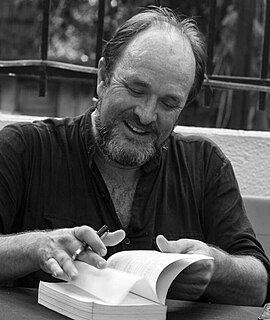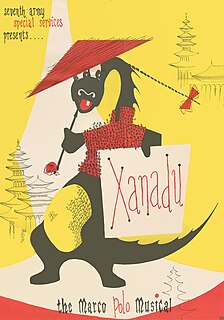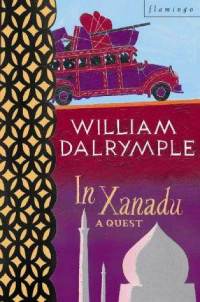
Kubla Khan is a poem written by Samuel Taylor Coleridge, completed in 1797 and published in 1816. It is sometimes given the subtitles "A Vision in a Dream" and "A Fragment." According to Coleridge's preface to Kubla Khan, the poem was composed one night after he experienced an opium-influenced dream after reading a work describing Shangdu, the summer capital of the Mongol-led Yuan dynasty of China founded by Kublai Khan. Upon waking, he set about writing lines of poetry that came to him from the dream until he was interrupted by "a person from Porlock". The poem could not be completed according to its original 200–300 line plan as the interruption caused him to forget the lines. He left it unpublished and kept it for private readings for his friends until 1816 when, at the prompting of Lord Byron, it was published.

Marco Emilio Polo was a Venetian merchant, explorer and writer who travelled through Asia along the Silk Road between 1271 and 1295. His travels are recorded in The Travels of Marco Polo, a book that described to Europeans the then mysterious culture and inner workings of the Eastern world, including the wealth and great size of the Mongol Empire and China in the Yuan Dynasty, giving their first comprehensive look into China, Persia, India, Japan and other Asian cities and countries.

Shangdu, also known as Xanadu, was the summer capital of the Yuan dynasty of China before Kublai decided to move his throne to the former Jin dynasty capital of Zhōngdū, which was renamed Khanbaliq, present-day Beijing. It is located in the present-day Zhenglan Banner, Inner Mongolia. In June 2012, Shangdu was made a World Heritage Site for its historical importance and for the unique blending of Mongolian and Chinese culture.

Muhammad Nizamuddin Auliya, also known as Hazrat Nizamuddin, and Mahbub-e-Ilahi was an Indian Sunni Muslim scholar, Sufi saint of the Chishti Order, and is one of the most famous Sufis from the Indian Subcontinent. His predecessors were Fariduddin Ganjshakar, Qutbuddin Bakhtiyar Kaki, and Moinuddin Chishti, who were the masters of the Chishti spiritual chain or silsila in the Indian subcontinent.

William Dalrymple is a Scottish historian and art historian, as well as a curator, photographer, broadcaster and critic. He is also one of the co-founders and co-directors of the world's largest writers festival, the annual Jaipur Literature Festival.

Khanbaliq or Dadu of Yuan was the winter capital of the Yuan dynasty founded by Kublai Khan in what is now Beijing, also the capital of China today. It was located at the center of modern Beijing. The Secretariat (中書省) directly administered the Central Region of the Yuan Empire and dictated policies for the other provinces. Kublai and his successors also claimed supremacy over the entire Mongol Empire following the death of Möngke Khan in 1259. Over time the unified empire gradually fragmented into a number of khanates.

Forman Christian College is an independent research liberal arts university located in Lahore, Punjab, Pakistan founded in 1864. The university is administered by the Presbyterian Church and follows an American-style curriculum.

Khan Bahadur Captain Sir Sikandar Hayat Khan,, also written Sikandar Hyat-Khan or Sikandar Hyat Khan, was an Indian politician and statesman from the Punjab who served as the Premier of the Punjab, among other positions.

Hazara is a region in the northeastern part of the Khyber Pakhtunkhwa province of Pakistan. It is located east of the Indus River and comprises eight districts: Abbottabad, Battagram, Haripur, Kolai-Palas, Mansehra, Upper Kohistan, Lower Kohistan, and Torghar.

Chilas is a city and is the divisional capital of Diamer District located in Gilgit-Baltistan, Pakistan, on the Indus River. It is part of the Silk Road connected by the Karakoram Highway and N-90 National Highway, which link it to Islamabad and Peshawar in the southwest, via Hazara and Malakand Divisions of Khyber Pakhtunkhwa. In the north, Chilas is connected to the Chinese cities of Tashkurgan and Kashgar in Xinjiang, via Gilgit, Aliabad, Sust, and the Khunjerab Pass.

Hakim Syed Zillur Rahman is an Indian scholar of Unani medicine. He founded Ibn Sina Academy of Medieval Medicine and Sciences in 2000. He had earlier served as Professor and chairman, Department of Ilmul Advia at the Ajmal Khan Tibbiya College, Aligarh Muslim University, Aligarh, for over 40 years before retiring as Dean Faculty of Unani Medicine. Presently, he is serving AMU as "Honorary Treasurer". In 2006, the Government of India awarded him the Padma Shri for his contribution to Unani Medicine.

From the Holy Mountain is a 1997 historical travel book by William Dalrymple that deals with the affairs of the Eastern Christians.

Xanadu: The Marco Polo Musical is an original musical written and produced in 1953 by Seventh Army Special Services in Germany, the first of the numerous stage musicals, film musicals and songs inspired in part by the Samuel Taylor Coleridge poem Kubla Khan with its familiar opening lines:

Syed Safdar Hussain Najafi was a scholar and religious leader.

Marco Polo is an American drama streaming television series inspired by Marco Polo's early years in the court of Kublai Khan, the Khagan of the Mongol Empire and the founder of the Yuan dynasty (1271–1368). The show premiered on Netflix on December 12, 2014. The series was created by John Fusco and stars Lorenzo Richelmy in the title role, with Benedict Wong as Kublai Khan. It was produced by The Weinstein Company. On January 7, 2015, Marco Polo was renewed by Netflix for a 10-episode second season, which premiered on July 1, 2016.
In the Footsteps of Marco Polo is a 2008 PBS documentary film detailing Denis Belliveau and Francis O'Donnell's 1993 retracing of Marco Polo's journey from Venice to Anatolia, Persia, India and China. The movie documents the first quest "to visit and document every region Marco Polo claimed to have traveled" using only land and sea methods of transportation. Mike Hale of The New York Times writes that the documentary includes how Belliveau and O'Donnell "encountered Mongol horsemen and hostile Chinese security officers and survived a firefight between Afghan factions. In the spirit of Polo's journey -- and to prove a point regarding the authenticity of his account -- they disdained airplanes, traveling by foot, on horses and camels and by jeep, boat and train." A text by the same name as the video, In the Footsteps of Marco Polo, written by Belliveau and O'Donnell, and published by Rowman & Littlefield, serves as a companion to the documentary film. In the Footsteps of Marco Polo has been used by Belliveau to create a unique interdisciplinary educational curriculum that he presents at schools and libraries across the United States and internationally.
Jamaat Ali Shah (1834–1951) was a Sufi of the Naqshbandi order and an author. He was President of All India Sunni Conference and the leader of the Shaheed Ganj Mosque. He was an influential leader of the Pakistan Movement.
Muhammad Habib Khan Tarin, Risaldar-Bahadur, CSI, was a cavalry officer of Tarin descent, who lived in the Hazara region on the Punjab Frontier, in British India.
Sayed Nafees al-Hussaini was a famous calligrapher, Islamic scholar, poet and spiritual figure. He was also blessed with calligraphy at one of the doors of the Masjid Al Haram in Makkah.
Syed Shahid Ali, was born in Pakistan on 29 December 1946. He played hockey, football and polo, which he also played at a national level. In 1996 he entered into the International Olympic Committee (IOC).















